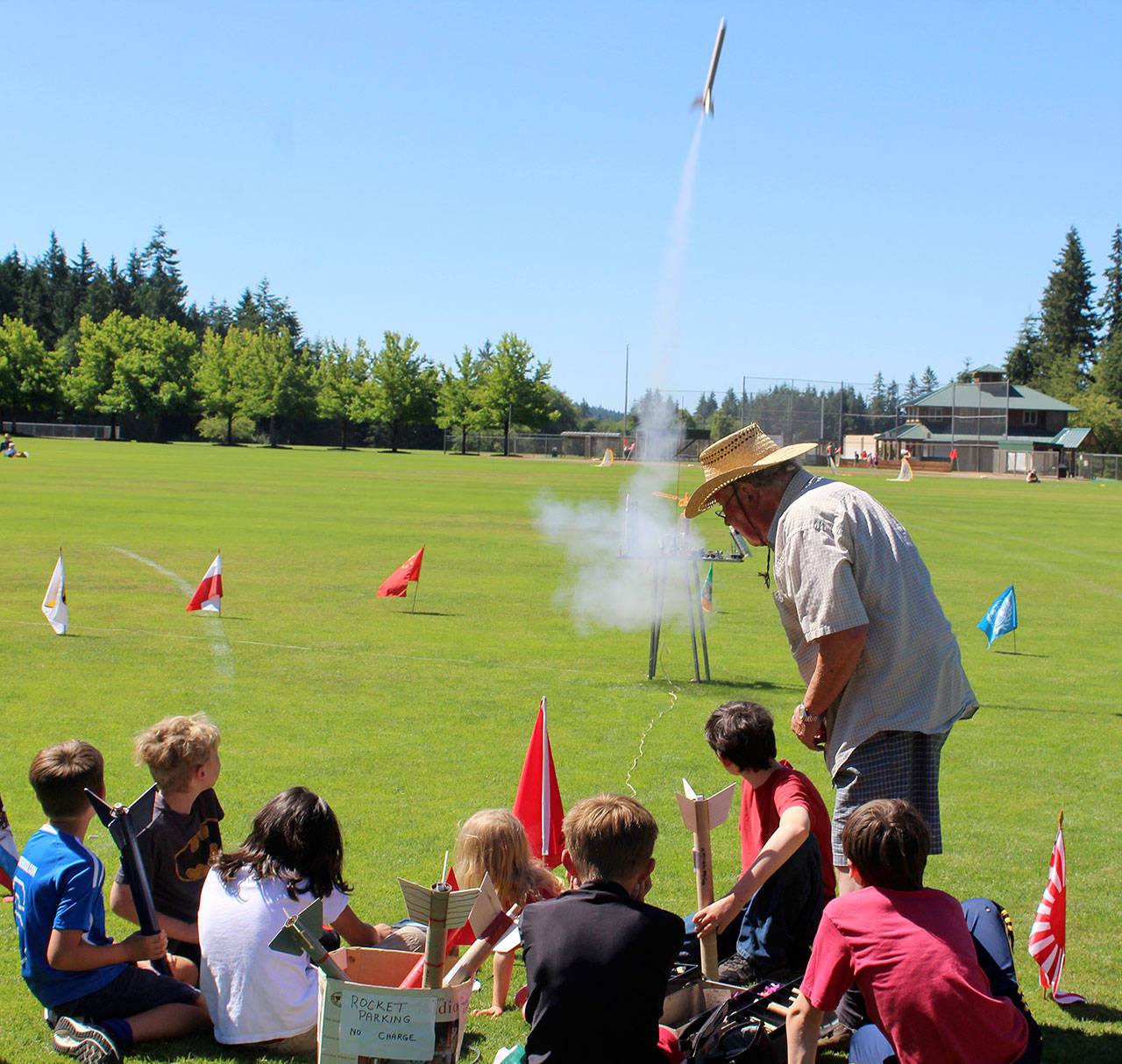Leonard Good piloted another successful rocket camp this week.
Thursday, kids headed off into infinity and beyond just as they have for the past 40 or so summers under the guidance of Good, Whidbey’s own Rocket Man.
One by one, campers blasted handmade 20-inch models into the sky over a soccer field at Langley Community Park. They counted down, craned their necks, then ran off to catch the missile as it parachuted down to Earth.
“That one went 274 feet, the highest yet,” announces Ben Janow, 13, who’s keeping track of the rockets’ reach using a cardboard protractor created by Mr. Good, as most youngsters addressed the legendary Leonard.
Good, 79, isn’t quite sure how many years he’s taught the Model Rocket Mini-Camp for South Whidbey Parks & Recreation District summer program.
But it’s long enough that two sons of a former student enthusiastically followed their dad’s trajectory and signed up for this week’s camp. The three-day program costs $40; it’s offered again July 24-26. Two mornings are spent crafting the spacecraft inside and the last day is spent outdoors.
“My kids did this class with Leonard 35 years ago,” says Bonnie Arndt, also known as grandmother to brothers Griffin and Caleb Arndt. “It’s just so fun to have a second generation doing this.”
First order of business outside was creating a safety zone. Good had students stick small flags from many nations in a wide circle where he placed his homemade electric rocket launcher. A long cord attaches it to a battery-operated circuit; each rocketeer turns a key to initiate ignition.
Pointing to a red flag with a logo of a battle ax, Good explains it’s from a yacht, not a country.
“You put in on your boat,” he says in a deadpan voice, “when your mother-in-law comes aboard.”
Adults groan, kids shrug.
And another rocket blasts off.
Good’s developed a comedy routine of sorts through his decades of rocketeering.
“See this spent cartridge,” he says, pulling out the used-up igniter from inside a launched rocket.
“I tell the kids, take this home, put it in your drawer and all your clothes will smell like rotten eggs. One boy said he was going to put it in his sister’s drawer. And I think he really did.”
Moms, Dads, siblings, grandparents, even a pair of great grandparents watch as one dozen kids, ages 4 to 13, each count down to lift off. (Children under the age of 9 can participate as long as an adult accompanies them.)
Brothers Ezekiel and Xavier Broyles have rocket science in their genes.
“Their great-great grandfather worked on several NASA projects, including the Apollo 16 mission,” explains Charlene Davenport, the boys’ great grandmother. “That was my father. He also worked on the Manhattan Project.”
Davenport brought along a poster Xavier made for a fourth-grade project. It shows a collage of newspaper clippings and other items about his great-great grandfather, Donald E. Davenport.
Xavier’s rocket is up next. It takes off in a flash but ends in a crash.
“The parachute didn’t come out,” he says, checking for damage. “But I think it’s okay.”
Some paint or name their rockets, such as “To the Moon.”
Good supplies the parts, collecting them from unusual sources.
The 20-inch cardboard tubes are the rolls left behind from starchy, white paper spread onto patient tables at doctors offices. The plastic, rounded nose cone looks like half of a fake Easter egg because that’s exactly what it is — or was.
And the tiny parachutes?
Made from cut-up white plastic bags and strings.
Before students dive into assembling parts, Good explains how a rocket is designed and what forces create its propulsion power. Science, aerodynamics and math — especially algebra — are all involved.
“And I’m not really good at math,” he admits.
Good failed algebra.
Twice.
“I got a “C” the third time I took it. That’s why I like to teach the children. I want them to succeed.”
Good is also known as the Science Guy. A certified teacher, he’s led a series of science programs at public, private and alternative schools around South Whidbey since moving to the island in 1968.
“I’ve been teaching for about 50 years,” he says. “And still going.”
After two hours overseeing a dozen kids and their rocket ships under the hot noon sun, Good takes a seat in the park’s administrative offices to rest and cool off.
He needs to load up his vehicle with boxes of parts and building materials and be on his way.
But the kids still have questions and requests.
Can you help me fix this crack? Can you help me untangle this parachute? How do I launch my rocket at home without a rocket launcher?
He gets out the glue, dabs it in the right spot, explains the fine art of disentanglement, then heads for the back of his 1969 VW bus and digs into his traveling educational files.
“Here’s an instruction sheet I wrote up,” he tells 10-year-old Griffin Arndt. “Now don’t burn up your lawn.”
Then comes the familiar Leonard Good farewell.



